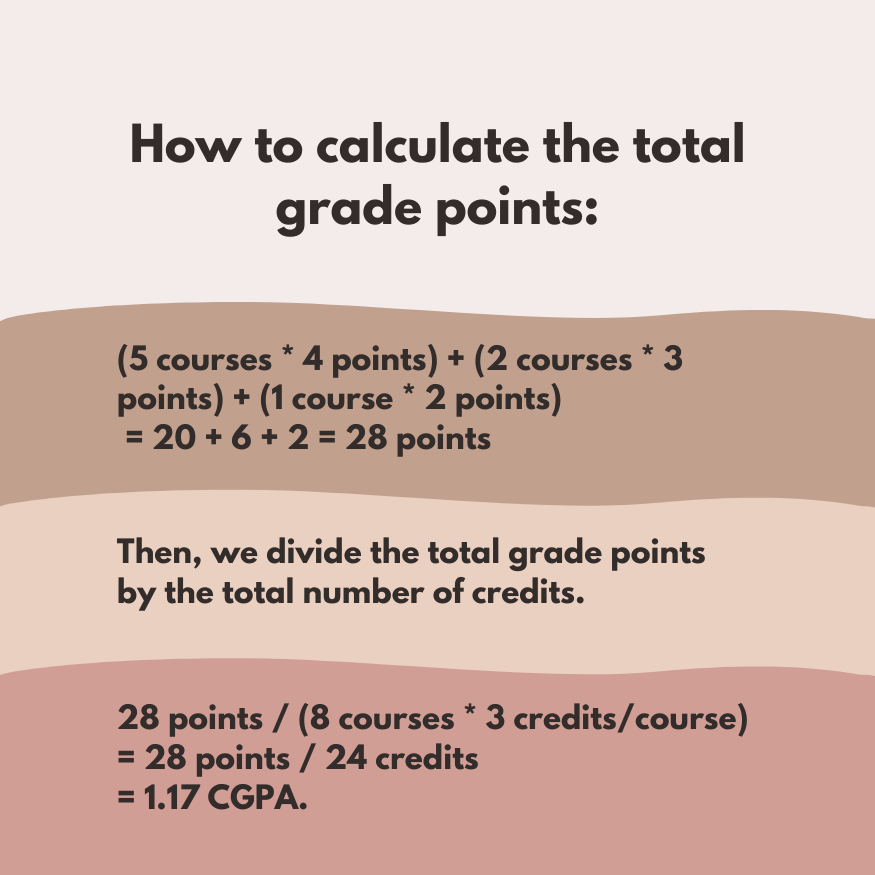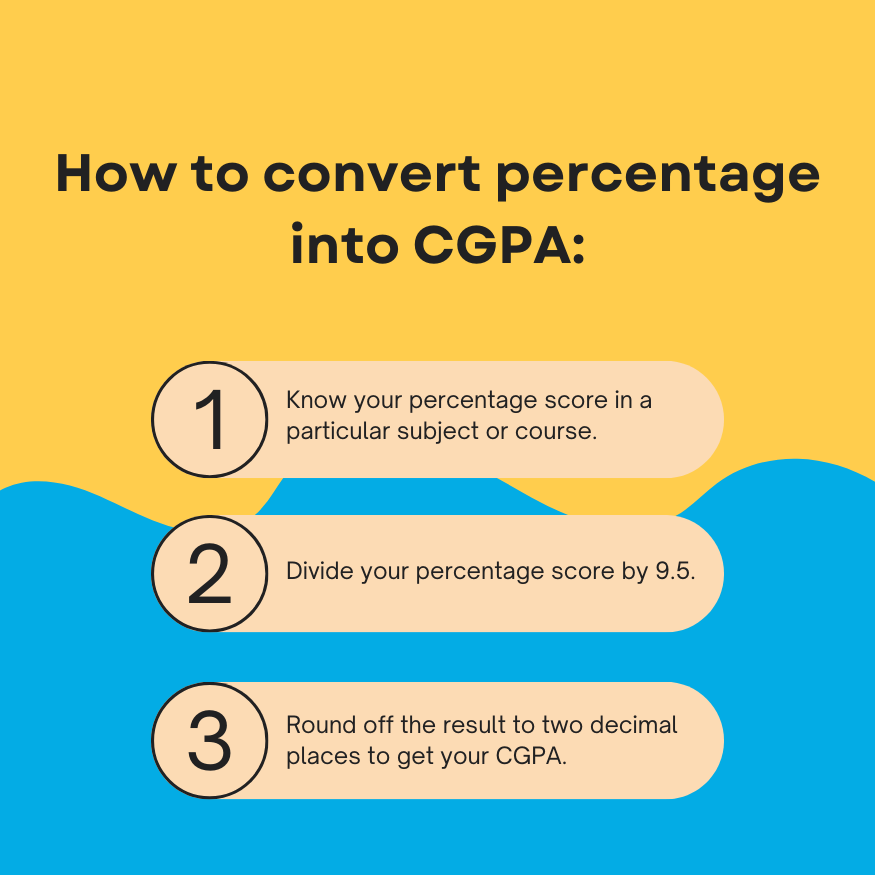Hey there, welcome to our guide on converting percentages to CGPA!
We’re getting into the world of grades and evaluations, something every student knows all too well. While percentages have been the tried and true method of grading for ages, Cumulative Grade Point Average (CGPA) is quickly gaining traction for its more comprehensive evaluation approach.
So, what exactly is CGPA?
It’s a system that calculates your overall performance throughout your academic career, giving you a clearer picture of your achievements.
Now, it isn’t rocket science if you want to know how to calculate percentages from CGPA. It’s a simple equation: CGPA equals your percentage divided by 9.5.
CGPA= Percentage/ 9.5.
But why bother with CGPA when we’ve all grown up with percentages? That’s a fair question. See, percentages only tell you part of the story.
They’re great for individual assessments, but CGPA gives you the big picture. It considers all your grades over time, offering a more holistic view of your academics.
So, how convert percentage to CGPA? This blog will walk you through the entire process, step by step. From understanding the components of CGPA calculation to converting your percentages, we’ve covered all the bases. By the time you’re done with this guide, you’ll be a CGPA conversion pro.
Also read: CGPA to GPA
Leap Advantage Virtual Spot Offer Event on May 10th 2024

Last call to secure your spot for Masters in US for Fall ’24 Intake
Leap Advantage Virtual Spot Offer Event on May 10th 2024
Last call to secure your spot for Masters in US for Fall ’24 Intake

What is CGPA?
CGPA stands for Cumulative Grade Point Average. It is a grading system used in educational institutions to evaluate a student’s overall academic performance.
In CGPA, grades are converted into points and then weighted based on the importance of each course. The weighted average of these points is then used to calculate the CGPA.
For example, let’s say a student has taken 8 courses, each worth 3 credits. They received an A (4 points) in 5 courses, a B (3 points) in 2 courses, and a C (2 points) in 1 course.
To calculate the total grade points, we multiply the number of credits by the grade point for each course and add them up:

Importance Of CGPA
CGPA is an essential aspect of student evaluation in educational institutions. It provides a comprehensive understanding of a student’s overall academic performance.
CGPA evaluates the importance of different courses and their weightage in the performance evaluation process. CGPA helps students to track their academic progress over time and set goals for themselves.
It also helps institutions in making informed decisions about admission, scholarships, and placement opportunities. Therefore, students need to understand CGPA and its significance in their academic careers.
CGPA is an essential factor for students who want to study abroad. Many countries and universities worldwide accept CGPA as a standard measure of academic performance. Many universities in the USA, UK, Canada, Australia, and Asia consider CGPA for admission and scholarship opportunities.
Here is the list of top Universities worldwide which accept CGPA:
| University | Country |
| Massachusetts Institute of Technology | USA |
| University of California, Berkeley (UC Berkeley) | USA |
| University of Cambridge | UK |
| University of Oxford | UK |
| King’s College London | UK |
| Australian National University | Australia |
| University Melbourne | Australia |
| University of Toronto | Canada |
| University of Amsterdam | Netherlands |
| National University of Singapore | Singapore |
Overall, having a good CGPA can enhance a student’s academic and career prospects, especially if they plan to study abroad.
Also read: How to calculate the percentage of marks
How does CGPA differ from the percentage?
CGPA and percentage are two different methods of evaluating a student’s academic performance.
While the percentage is based on the overall percentage of marks obtained by the student, CGPA is a weighted average of the grade points earned by the student.
CGPA takes into consideration the importance of each course and its weightage in the performance evaluation process, while percentage does not.
Therefore, CGPA provides a more comprehensive understanding of a student’s overall academic performance compared to percentage.
Components of CGPA Calculation
The CGPA calculation in the grade point system involves converting grades into points.
Each grade corresponds to a specific point value, which is then multiplied by the credit hours of the course to determine the quality points earned.
The sum of the quality points earned is divided by the total credit hours attempted to get the CGPA.
For example, Let’s take a student, Rohan, who just completed his first semester with 4 courses. Here’s how his CGPA might be calculated:
- Grades and Points:
| Subjects | Points |
| History | 4 points |
| Literature | 3.5 points |
| Maths | 2.5 points |
| Chemistry | 2 points |
Rohan scored highest in History, followed by Literature and Maths, and the lowest in Chemistry.
| Calculating Total Points: We add the points for each course: 4 points (History) + 3.5 points (Literature) + 2.5 points (Maths) + 2 points (Chemistry) = 12 points. Finding CGPA: Assuming there are 4 courses in total, we divide the total points by the number of courses: 12 points / 4 courses = 3. |
Therefore, Rohan’s CGPA for the semester would be 3. The specific point system and scale might differ depending on the university or program.
Weightage of Courses: Understanding the importance of different courses
The weightage of courses in the CGPA calculation is an essential aspect of evaluating a student’s academic performance. Each course is assigned a weightage based on its importance and credits earned.
The courses with higher credits and importance have more weightage than others. This means that performing well in these courses can have a more significant impact on a student’s CGPA.
Therefore, students must understand the weightage of each course and prioritise their efforts accordingly, especially in courses that carry more weightage.
For example, a student takes five courses in a semester, and each of them carries three credits. Let’s say the courses are:
- Mathematics
- English
- History
- Biology
- Physics
The university assigns different weights to each course based on its importance.
Suppose Mathematics, English, and Biology carry a weightage of 1, while History and Physics carry a weightage of 2.
This means that the grades earned in History and Physics will carry more weightage in the CGPA calculation than the grades earned in Mathematics, English, and Biology.
Therefore, a student should focus more on History and Physics to achieve a higher CGPA.
Converting Percentage to CGPA
To convert percentage into CGPA, we use a simple formula: CGPA = Percentage/9.5.
| For example, let’s say a student has scored 85% in their exams To convert this percentage into CGPA, we divide 85 by 9.5. The result is approximately 8.95. Therefore, the student’s CGPA would be 8.95. |
This calculation is essential to track a student’s academic performance in the CGPA system. It helps students understand their overall academic progress and set goals to improve their performance.
Step-by-step conversion of Percentage into CGPA
Converting the percentage to CGPA is a simple process that involves dividing the percentage by 9.5.
Here’s a step-by-step guide to help you convert percentages into CGPA.

For instance, let’s say you scored 85% in a particular course. To convert your percentage into CGPA, you would divide 85 by 9.5, which would give you 8.95. Rounding off this result to two decimal places, you get a CGPA of 8.95.
Here’s a table that shows how different percentage scores convert to CGPA:
| Percentage Score | CGPA |
| 90 – 100 | 9.5 |
| 80 – 89 | 8.5 |
| 70 – 79 | 7.5 |
| 60 – 69 | 6.5 |
| 50 – 59 | 5.5 |
Remember, CGPA is a comprehensive evaluation system that takes into consideration the weightage of each course and its importance in the performance evaluation process. Therefore, it is essential to strive for a high CGPA to succeed in academic careers.
CGPA to Percentage
Now that you have understood how to calculate percentage to CGPA, you may be wondering about how to calculate CGPA to percentage. Don’t worry, we have a solution for you.
| The formula to convert CGPA to percentage is Percentage = CGPA x 9.5. |
For example, if a student has a CGPA of 8.2, then their percentage would be 8.2 x 9.5 = 77.9%.
The table below shows the conversion of CGPA to percentage for different CGPA values:
| CGPA | Percentage |
| 6.0 | 57% |
| 6.5 | 62% |
| 7.0 | 67% |
| 7.5 | 71% |
| 8.0 | 76% |
| 8.5 | 81% |
| 9.0 | 86% |
| 9.5 | 100% |
Tips & Tricks to Calculate Percentage To CGPA
Here are a few tips to convert percentage to CGPA:
- Ensure that you know your university’s grading scale, as it can differ from the standard 10-point CGPA system.
- If your university uses the standard 10-point scale, you can easily convert your percentage score to CGPA by dividing it by 9.5.
- Bookmark the CGPA formula (CGPA = Percentage / 9.5) for quick calculations.
- If your university uses a non-standard CGPA scale, check their official website or ask your advisor for the conversion method.
- Use a calculator to ensure accurate CGPA calculations, as decimals can be confusing to work with.
- Round your CGPA answer to the appropriate decimal places, typically two.
Wrapping Up
CGPA is a comprehensive evaluation system that provides a clear understanding of a student’s overall academic performance. It takes into consideration the importance of different courses and their weightage in the performance evaluation process.
Understanding CGPA is important for students who want to excel in their academic careers. If you still have any confusion or queries, you can always reach out to LeapScholar’s expert counsellors and book a free call today!
Frequently Asked Questions
-
Q. How to calculate percentage from CGPA?
A. To convert a percentage to CGPA, you need to divide the percentage by 9.5. For example, if a student has scored 80% in their exams, their CGPA would be 8.42 (80/9.5). This formula is widely used in educational institutions to evaluate a student’s overall academic performance.
-
Q. How to convert the percentage to cgpa?
A. To convert a percentage to CGPA, you need to divide the percentage by 9.5. For example, if your percentage is 80%, then your CGPA would be 8.42 (80/9.5). This formula is commonly used in educational institutions to convert percentage grades into CGPA for a more comprehensive evaluation of a student’s academic performance.
-
Q. How to calculate cgpa from marks?
A. To calculate CGPA from marks, you need to first convert the marks into grades using the grade conversion table provided by your school or institution. Then, calculate the grade point for each subject by multiplying the grade with the credit hours assigned to the subject. Finally, calculate the weighted average of all the grade points obtained and divide it by the total credit hours to get the CGPA.
-
Q. What is the CGPA calculation formula?
A. The CGPA calculation formula is quite simple. You just need to divide the percentage obtained by the student by 9.5 to get the CGPA. For example, if a student has scored 85% in their exams, their CGPA would be 8.95 (85/9.5). This formula is used in educational institutions to evaluate a student’s overall academic performance.
-
Q. Is it difficult to convert a percentage to Cgpa?
A. Converting percentage to CGPA is not a difficult task. It involves dividing the percentage by 9.5 to get the CGPA. CGPA stands for Cumulative Grade Point Average and is used to evaluate a student’s overall academic performance. Understanding CGPA is important for students who want to excel in their academic careers.
-
Q. What is CGPA, and how is it essential to convert the percentage to CGPA?
A. CGPA stands for Cumulative Grade Point Average, and it is a grading system used in educational institutions to evaluate a student’s overall academic performance. It is important to convert percentage to CGPA because CGPA provides a more comprehensive understanding of a student’s academic performance compared to percentage. CGPA takes into consideration the importance of each course and its weightage in the performance evaluation process.
-
Q. How to convert percentage to cgpa out of 4?
A. To convert the percentage to CGPA out of 4, you need to divide the percentage by 25. For example, if you have a percentage of 80%, your CGPA out of 4 would be 3.2 (80 divided by 25). This method is commonly used in Indian universities and colleges.
-
Q. How to calculate the percentage to CGPA at VTU University?
A. To convert the percentage to CGPA in VTU University, you can use the formula CGPA = ∑(Ci x Si) / ∑ Ci, where Si is the SGPA of the ith semester and Ci is the total number of credits obtained in that semester. First, you need to calculate the SGPA of each semester using the given formula SGPA = (Total Grade Points Obtained in the Semester / Total Credits Offered in the Semester).
-
Q. Can students use online converters to convert percentages to CGPA?
A. Yes, there are many online converters available that can help students convert their percentage to CGPA. These converters can be useful for those who are not familiar with the CGPA calculation process or find it challenging to calculate it manually. However, it is always recommended to double-check the results obtained from these converters to ensure accuracy.
-
Q. Is it beneficial to convert a percentage to CGPA?
A. Converting a percentage to CGPA can be beneficial as it provides a more comprehensive evaluation of a student’s academic performance. CGPA takes into consideration the importance of different courses and their weightage, while percentage does not. It helps students to track their academic progress over time and set goals for themselves.
-
Q. How long does it take to convert the percentage to CGPA?
A. The process of converting the percentage to CGPA is relatively straightforward and does not take much time. It involves dividing the percentage by 9.5, which gives the CGPA. For example, if a student has scored 80% in their exams, their CGPA would be 8.42. The conversion process can be done quickly and easily using a calculator, and it is an essential step for students to understand their academic performance.








